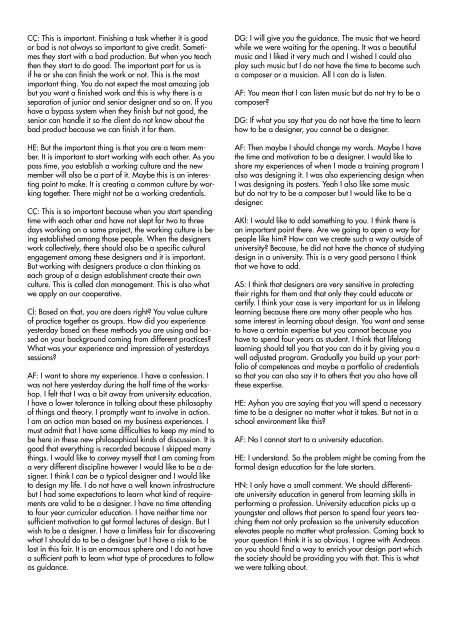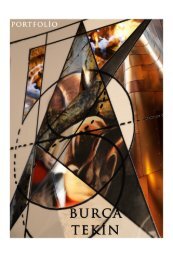hadii
You also want an ePaper? Increase the reach of your titles
YUMPU automatically turns print PDFs into web optimized ePapers that Google loves.
CÇ: This is important. Finishing a task whether it is good<br />
or bad is not always so important to give credit. Sometimes<br />
they start with a bad production. But when you teach<br />
then they start to do good. The important part for us is<br />
if he or she can finish the work or not. This is the most<br />
important thing. You do not expect the most amazing job<br />
but you want a finished work and this is why there is a<br />
separation of junior and senior designer and so on. If you<br />
have a bypass system when they finish but not good, the<br />
senior can handle it so the client do not know about the<br />
bad product because we can finish it for them.<br />
HE: But the important thing is that you are a team member.<br />
It is important to start working with each other. As you<br />
pass time, you establish a working culture and the new<br />
member will also be a part of it. Maybe this is an interesting<br />
point to make. It is creating a common culture by working<br />
together. There might not be a working credentials.<br />
CÇ: This is so important because when you start spending<br />
time with each other and have not slept for two to three<br />
days working on a same project, the working culture is being<br />
established among those people. When the designers<br />
work collectively, there should also be a specific cultural<br />
engagement among these designers and it is important.<br />
But working with designers produce a clan thinking as<br />
each group of a design establishment create their own<br />
culture. This is called clan management. This is also what<br />
we apply on our cooperative.<br />
Cİ: Based on that, you are doers right? You value culture<br />
of practice together as groups. How did you experience<br />
yesterday based on these methods you are using and based<br />
on your background coming from different practices?<br />
What was your experience and impression of yesterdays<br />
sessions?<br />
AF: I want to share my experience. I have a confession. I<br />
was not here yesterday during the half time of the workshop.<br />
I felt that I was a bit away from university education.<br />
I have a lower tolerance in talking about these philosophy<br />
of things and theory. I promptly want to involve in action.<br />
I am an action man based on my business experiences. I<br />
must admit that I have some difficulties to keep my mind to<br />
be here in these new philosophical kinds of discussion. It is<br />
good that everything is recorded because I skipped many<br />
things. I would like to convey myself that I am coming from<br />
a very different discipline however I would like to be a designer.<br />
I think I can be a typical designer and I would like<br />
to design my life. I do not have a well known infrastructure<br />
but I had some expectations to learn what kind of requirements<br />
are valid to be a designer. I have no time attending<br />
to four year curricular education. I have neither time nor<br />
sufficient motivation to get formal lectures of design. But I<br />
wish to be a designer. I have a limitless fair for discovering<br />
what I should do to be a designer but I have a risk to be<br />
lost in this fair. It is an enormous sphere and I do not have<br />
a sufficient path to learn what type of procedures to follow<br />
as guidance.<br />
DG: I will give you the guidance. The music that we heard<br />
while we were waiting for the opening. It was a beautiful<br />
music and I liked it very much and I wished I could also<br />
play such music but I do not have the time to become such<br />
a composer or a musician. All I can do is listen.<br />
AF: You mean that I can listen music but do not try to be a<br />
composer?<br />
DG: If what you say that you do not have the time to learn<br />
how to be a designer, you cannot be a designer.<br />
AF: Then maybe I should change my words. Maybe I have<br />
the time and motivation to be a designer. I would like to<br />
share my experiences of when I made a training program I<br />
also was designing it. I was also experiencing design when<br />
I was designing its posters. Yeah I also like some music<br />
but do not try to be a composer but I would like to be a<br />
designer.<br />
AKİ: I would like to add something to you. I think there is<br />
an important point there. Are we going to open a way for<br />
people like him? How can we create such a way outside of<br />
university? Because, he did not have the chance of studying<br />
design in a university. This is a very good persona I think<br />
that we have to add.<br />
AS: I think that designers are very sensitive in protecting<br />
their rights for them and that only they could educate or<br />
certify. I think your case is very important for us in lifelong<br />
learning because there are many other people who has<br />
some interest in learning about design. You want and sense<br />
to have a certain expertise but you cannot because you<br />
have to spend four years as student. I think that lifelong<br />
learning should tell you that you can do it by giving you a<br />
well adjusted program. Gradually you build up your portfolio<br />
of competences and maybe a portfolio of credentials<br />
so that you can also say it to others that you also have all<br />
these expertise.<br />
HE: Ayhan you are saying that you will spend a necessary<br />
time to be a designer no matter what it takes. But not in a<br />
school environment like this?<br />
AF: No I cannot start to a university education.<br />
HE: I understand. So the problem might be coming from the<br />
formal design education for the late starters.<br />
HN: I only have a small comment. We should differentiate<br />
university education in general from learning skills in<br />
performing a profession. University education picks up a<br />
youngster and allows that person to spend four years teaching<br />
them not only profession so the university education<br />
elevates people no matter what profession. Coming back to<br />
your question I think it is so obvious. I agree with Andreas<br />
on you should find a way to enrich your design part which<br />
the society should be providing you with that. This is what<br />
we were talking about.<br />
You are absolutely right in looking ways to learn certain skills<br />
that would make you a designer. I do not say that I am a sociologist.<br />
I do not have constrictions on what you cannot be but<br />
design profession is very specific. You have to learn specific<br />
techniques. You need to follow certain rules. Than this is what<br />
it is. I just wanted to separate out university education from a<br />
certain profession.<br />
DG: When we are talking about life long learning for designers,<br />
we are not opening at least to my mind saying the<br />
whole population of planet earth through this process can<br />
participate to become a designer. That is not what I thought<br />
we were talking about. I thought we were talking about that in<br />
the classical sense of professional designers, it is not enough<br />
for them only to have a formal education. They have to go<br />
beyond the formal education and keep on learning. A structure<br />
to further enhance the capacity of a professional designer<br />
after his formal education requires the sophisticated system.<br />
The same machine is not appropriate in permitting anyone to<br />
become a designer at any time and any pace. Another system<br />
maybe could work. But it is not the same system because the<br />
lifetime learning assume that the designers are off at a certain<br />
point as a foundation that came to continue whereas, what<br />
you are suggesting that anybody can become a designer<br />
but participating in this program is that they will be having<br />
an opportunity to learn the basics of the system. When we<br />
are talking about the professionals, going on to a system of<br />
lifelong learning, they have the basics. When a designer have<br />
a formal education, he does not have to go back into basic<br />
composition. Lifelong learning does not teach basic composition.<br />
It is the additional things. That is why I think we were<br />
talking about different things.<br />
Cİ: David I think it is a possible direction. I agree that it is<br />
different than lifelong learning for professional or studying<br />
designers, but for amateur designers. I remember from the<br />
talk of yesterday, you gave the example of Brody. You said if I<br />
am not wrong, he did not study design. Ok it is a very exceptional<br />
thing but how would you compare it?<br />
DG: Of the six and a half billion of year on planet earth,<br />
there are two examples like that I know of. There are exceptional<br />
people and there is no doubt. But to make a system, to<br />
assume that anybody can do that I think create expectations<br />
that cannot be met. But it is a different system. I am sure. I<br />
think what we are talking about here is lifelong learning for<br />
designers that are already designers but not an opportunity<br />
for anyone who is not a designer which is another issue.<br />
There may be classes and formats. It cannot be a one thing<br />
for everybody or it is nothing.<br />
AS: I think it is a little bit abstract discussion. I think there is<br />
one person and he describes his personal experience and interest<br />
to learn more. I think it is a beautiful and an appropriate<br />
case for our discussions on the idea of lifelong learning. But<br />
how and whom could we address and in what way? Limiting<br />
or not limiting, considering if it is a designer tag or not, that is<br />
for me not relevant. I would like to listen this person with these<br />
interests.<br />
He needs some source and some place where he can<br />
satisfy his interests. Obviously university does not offer<br />
because they force him to study a four year diploma<br />
program so we need to find something else. It is a very<br />
valid and good example of what we were discussing<br />
here. Even if it is for designers as you consider, for me<br />
lifelong learning does not start at the university. It also<br />
starts at an early childhood learning about composition,<br />
design thinking and so on. We can be much more<br />
pragmatic in our discussion here in order to achieve<br />
some sort of outcome of this workshop.<br />
HN: I would like to talk about the conceptual confusion.<br />
When our friend said I would like to be a designer I<br />
guess he did not mean to be a professional designer.<br />
He just told us that he would like to look at his own life<br />
from a design perspective. That is quite fine. It is like I<br />
would like to review my life from a lawyers perspective.<br />
That does not make me a lawyer, or an architect. I<br />
constantly draw things and tried to look at things from<br />
a design perspective because design perspective eases<br />
up thinking for me. It is something that I developed. I<br />
would never call myself a designer for that. So that is<br />
just a little remark. And maybe in that respect, lifelong<br />
learning could offer designers lifelong learning and lay<br />
person a design perspective at a separate perspective.<br />
I have no objection to that. In that way we can raise the<br />
awareness of design.<br />
AI: I think it is nice to discuss it like this because yesterday<br />
each section was different from each other. After<br />
yesterday me and Yeşim went to same direction and<br />
talked about what is the aim and goal of the workshop.<br />
Could you re-describe the aim of this workshop? I think<br />
at this stage we can focus on reaching the aim. Now we<br />
opened a discussion only but we do not have a goal. It<br />
is nice to talk what we understand about lifelong learning.<br />
What does it mean? Because we are working with<br />
communities and third parties to create products as designers.<br />
I also know some craftsman who develop themselves<br />
alone. I have for instance some friends who only<br />
went to high school but did not go to a design education<br />
in a university. They develop themselves by attending<br />
and contributing in workshops and events. Those things<br />
they took benefit from it and started to think differently.<br />
We also have a tutor here in Bilgi University. He went<br />
and started working with an apprentice. He did not<br />
have a designer background but we wanted to give him<br />
critics. But we told him we are not designers and we did<br />
not expect a designer but a person between apprentice<br />
and master. Some of them are better than our students.<br />
We are collaborating with them and they are very<br />
ambitious with motivation. When we started the first<br />
section with David it was very exciting for me because<br />
I had a chance to witness other contributors ideas. We<br />
can create a lifelong learning path to make people<br />
understand themselves and to understand what are the<br />
systems, manuals and templates that is necessary to<br />
establish. We can create a roadmap that benefits from<br />
newly invented technologies and other professions.






